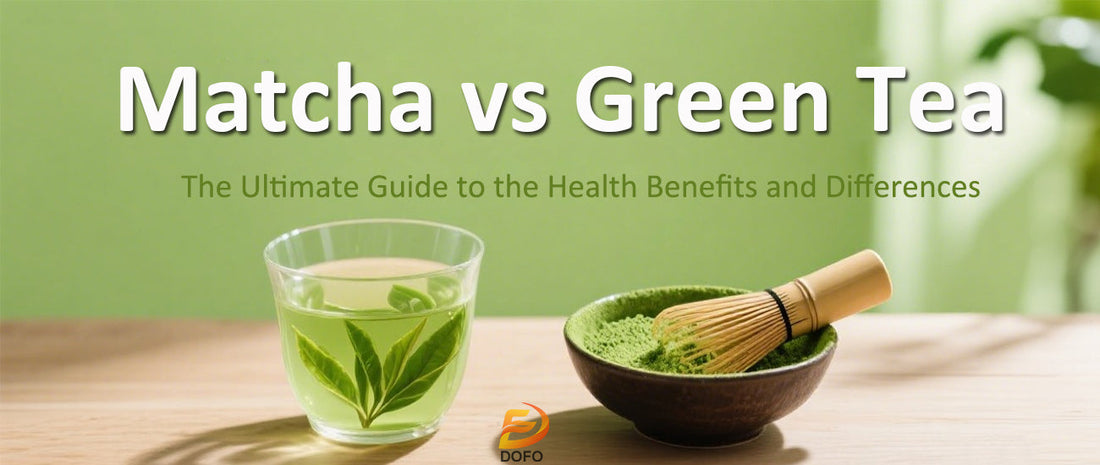
Matcha vs Green Tea: The Ultimate Guide to Health Benefits and Differences
HHShare
Author:Nationally certified senior tea appraiser Xu Jiahua
When it comes to healthy tea choices, “matcha and green tea” often top the list. While they both come from the same plant, Camellia sinensis, their cultivation, processing, and nutritional profiles differ significantly.
In this guide, we’ll explore their differences, benefits, and how to choose the right one for your lifestyle.
Is Green Tea and Matcha the Same Thing?
No, they're not exactly the same. While matcha and green tea come from the same plant, matcha comes in a powdered form and can be consumed whole, while green tea is steeped.
Cultivation and Growth
Green tea and matcha come from the same plant, but green tea is grown in sunlight, while matcha uses shade-grown leaves. This shading boosts chlorophyll and amino acids, giving matcha its bright green color and rich umami taste.
Processing and Production
Green tea- after harvesting, green tea leaves are rolled and dried into loose leaf tea.
Matcha-matcha leaves are shade-grown, hand-picked, steamed, dried, and finely ground into powder, making it a more concentrated tea form used in drinks and cooking.
Matcha: Vibrant, Creamy, and Nutrient-Dense
Matcha stands out as a bright green powder with a rich, creamy texture. Because you consume the entire leaf in powdered form, you’re ingesting a higher concentration of nutrients compared to steeped green tea.
High in EGCG (Epigallocatechin gallate)
Matcha is renowned for its high antioxidant content, which is significantly greater than that of regular green tea. Matcha contains significantly more EGCG—a powerful antioxidant.
PubMed Central (U.S. National Library of Medicine) published an article stating that EGCG is associated with cancer prevention, improved metabolism, and anti-inflammatory effects.
Boosts Focus Without the Jitters
Thanks to the caffeine naturally present in matcha, which is higher due to consuming the whole leaf, and its amino acid L-theanine, matcha promotes a calm, focused mental state without the caffeine jitters often associated with coffee.
Matcha contains more caffeine than regular green tea, resulting in a stronger energy boost. Many find it a perfect beverage for mental clarity and sustained energy.
Supports Detox and Skin Health
The high chlorophyll content helps detoxify the body and skin, promoting a clearer complexion and overall wellness.
Green Tea: Delicate, Refreshing, and Naturally Healthy
Green tea's light, pure taste and delicate aroma make it a refreshing beverage of choice for many people around the world. Whether enjoyed hot or cold, it offers a soothing experience that can be easily incorporated into daily life.
Detoxification and Gut Health
Green tea contains compounds that support detoxification and promote healthy gut flora. Its antioxidants help reduce inflammation and improve digestion.
Boosts Metabolism
According to the Harvard T.H. Chan School of Public Health regularly drinking green tea may boost fat oxidation and metabolic rate, which can support healthy weight management.
Natural Anti-Inflammatory Properties
Rich in natural antioxidants like catechins, green tea offers powerful anti-inflammatory properties that support immune health, reduce chronic inflammation, and promote overall wellness.
The Main Difference Between Matcha and Green Tea
Understanding some of the key differences between matcha and green tea can help you choose the tea that best suits your taste and health goals.
Flavor & Usage Preferences
- Matcha: Rich, earthy, umami flavor; great for lattes, smoothies, and desserts. Matcha is especially popular in matcha lattes and is widely used in baked goods like cakes and cookies.
- Green Tea: Light, grassy, slightly sweet; perfect for sipping hot or iced. Green tea is also commonly enjoyed in green tea lattes.
If you’re a green tea lover, don’t miss our guide:"Best Green Tea for Health – A Complete Guide". It’s packed with tips, benefits, and everything you need to know to choose the best green tea for your wellness routine.
How to Prepare

Matcha: Whisk 1 teaspoon of powder with hot water until frothy. For creamy textures, add milk or plant-based alternatives.
Green Tea: Steep leaves or tea bags in hot water (not boiling) for 2-3 minutes. The recommended steep time of 2-3 minutes helps balance flavor and maximize antioxidants, while preventing bitterness. Then enjoy.
Nutritional Content
Matcha is packed with higher levels of catechins, especially EGCG, along with more caffeine, L-theanine, and antioxidants, since you’re consuming the entire leaf. This makes it a more concentrated source of nutrients.
Green tea contains key antioxidants like catechins and flavonoids, along with vitamins C and B, which help support metabolism, immune function, and heart health. While milder than matcha, its nutritional profile still provides meaningful health benefits as part of a balanced diet.
Health Benefits
Both matcha and green tea offer impressive health benefits – here’s a look at what each has to offer.
Health Benefits of Matcha
Here are some of the key health benefits matcha has to offer:
- Higher in antioxidants like EGCG
- Boosts focus and calm energy (caffeine + L-theanine)
- Supports metabolism and fat burning
- Rich in chlorophyll for detox and skin health
Health Benefits of Green Tea
Here are some of the key health benefits green tea has to offer:
- Gentle antioxidants that support immunity
- Easy on digestion, great after meals
- Helps heart health by lowering cholesterol
- Low in caffeine, ideal for daily drinking
Matcha vs Green Tea: Key Differences at a Glance
Here’s a quick side-by-side to make it easier to see how matcha and green tea differ.
|
Feature |
Matcha |
Green Tea |
|
Form |
Powdered whole leaves |
Steeped leaves |
|
Flavor |
Rich, creamy, umami |
Light, grassy, refreshin |
|
Preparation |
Whisked into water or used in recipes. |
Steeped in hot water |
|
Nutritional Content |
Concentrated antioxidants, caffeine, chlorophyll |
Milder antioxidants, moderate caffeine |
|
Health Benefits |
Strong antioxidants, focus,detoxification |
Digestive support, heart health, hydration |
How to Choose Between Matcha and Green Tea
Matcha: A More Potent Option for Energy and Antioxidants
Matcha is packed with EGCG, a powerful antioxidant linked to reduced inflammation and better metabolism . Thanks to its caffeine and L-theanine combo, it gives you calm, focused energy—great for work or study.
If you want a strong antioxidant boost and steady energy, “matcha”is your go-to.
Green Tea: A Gentle Everyday Brew for Wellness and Balance
Green tea has a gentler flavor and less caffeine, making it ideal for daily drinking. It supports digestion, boosts metabolism, and helps fight inflammation without overloading your system. Perfect for a soothing, healthy routine.
If you prefer something light, calming, and easy to sip every day, “green tea”is the perfect match.
Frequently Asked Questions
Is it okay to drink matcha tea every day?
Absolutely! Many health enthusiasts incorporate matcha daily for its antioxidant benefits and energy boost. However, because of its caffeine content, moderation is advised, especially if you're sensitive to caffeine.
Matcha or green tea, which is better for weight loss?
Both can aid weight management, but matcha’s higher antioxidant levels and caffeine may provide a slight edge for fat oxidation and metabolism boost. Always combine with a balanced diet and exercise.
Can I substitute matcha for green tea?
Yes, in many recipes and routines, but remember that matcha is more concentrated. Adjust quantity accordingly to avoid excessive caffeine intake.
Come to DOFO and Taste the Freshness of Quality Tea!
If you love green tea, Dofo Tea is sure to satisfy your cravings. Our selection of fresh, premium green teas, hand-picked from natural ingredients, is pure and healthy, helping you balance your daily nutrition and enjoy quality time.





